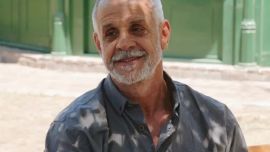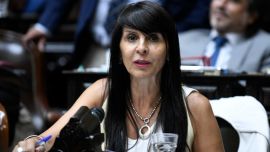Buenos Aires City Education Minister Soledad Acuña came under fire this week after saying in a radio interview that it is “too late” to look for students from impoverished areas who have dropped out of school.
Members of the ruling coalition slammed the minister for her remarks, accusing her of “giving up” on schoolchildren who have not returned to classrooms following temporary shutdowns related to the coronavirus pandemic.
Acuña, 46, suggested in an interview on Tuesday that some children who had not returned to schools were now metaphorically "lost” in the capital’s shantytowns, “already active in drug-trafficking or forced to work." In comments that drew fire from Frente de Todos, she said that there was no possibility of such students re-entering the educational system.
In an interview with the Modo Plager programme on Radio Rivadavia, the City official assured that there have been 6,500 school dropouts in the capital since March, 2020, adding that "there were 400 whom we could not recover because they had a very complex situation of impaired rights which needed intervention from other state areas, not just the educational."
Acuña added that 100 youngsters remain absent from school while maintaining that "after two years it is very late to go out looking for them, those kids are surely lost in some villa corridor, already active in drug-trafficking or forced to work."
"They have lost all possibilities and self-confidence regarding their opportunities to study, obviously we must give it a try but it is much harder than if this had been known two years ago with the [corresponding] decisions taken," affirmed the minister.
Pre-empting some of the controversy that would later come her way, the Bariloche-born minister aimed her fire at the Alberto Fernández administration, declaring that “there is no concrete real data on school dropouts, no official data."
Acuña, who has provoked controversy in the past by suggesting that some teachers prefer to be active politically than teach, previously urged parents to denounce “indoctrination” by teachers during virtual classes.
“The root of the excessively ideological political militancy in the classrooms lies in teacher training, how the profile of a teacher is defined in those institutes,” she said in November 2020, saying education professionals should “know that what they have to do is to teach the kids to think and not how to think.”
Reaction
Acuña’s latest remarks sparked controversy in both coalitions, with government officials rushing to comment.
"It’s never late for all Argentina’s children to be in school because that’s the place where they should be," responded National Education Minister Jaime Perczyk. "They’re all our children, there is always room for them in the Argentina we love."
He highlighted education plans launched for students and schools, picking out policies such as the Volvé return to school programme, the Conectar Igualdad computers scheme, Libros para Aprender, Progresar scholarships, the FinEs programme and vaccination schedules.
Acuña said in her Radio Rivadavia interview that the lack of data on dropouts made it impossible to activate policies for some children.
Science, Technology & Innovation Minister Daniel Filmus considered that her words "showed her discrimination against the poorest schoolchildren."
Frente de Todos Senator for the City Mariano Recalde accused the minister of giving up on students, saying her remarks "recognise that she will do nothing to combat school dropouts."
Following these criticisms Acuña picked up the gauntlet, replying to the national officials on Twitter: "Let’s tell it like it is – in the City we recovered 98 percent of the children who had lost touch with their schools during the first year of the pandemic. Where do they think the children of the lowest-income neighbourhoods in Greater Buenos Aires were while the schools were shut down for almost two years? Or do they really think that children who do not even have access to decent housing can be told to stay at home for so long when school is their only refuge and the guarantee of access to minimum rights?"
The City minister emphasised: "The City was the first jurisdiction in the country to open up their schools in October, 2020 and the first to return to classroom education in February, 2021. And this year we will again be bringing the start of the school year ahead. For those who did not do it in time, the challenge is much greater, of course. But the first step is to recognise the situation and tell society how many children dropped out of school in Buenos Aires Province and the rest of the country. Those responsible must construct a plan to recover those thousands and thousands of abandoned children. It’s their obligation and it’s urgent."
Defence
PRO deputy Alejandro Finocchiaro came out in defence of Acuña in the midst of the government criticisms after her controversial words on school dropouts in the pandemic.
Finocchiaro affirmed to Radio Rivadavia that Acuña "has told the truth and telling the truth does not stigmatise." He considered that the CTERA teachers’ union “believes that failure stigmatises” but explained that they “are mistaken” because in reality [failure] “must be overcome.”
The PRO deputy agreed with Acuña’s controversial estimate that almost 1.5 million children have dropped out of school nationwide, pointing out: “It’s late in the day but we must go out and look for them.”
Finocchiaro continued: "Where do they think the children were if not in school? They weren’t sitting reading books but in the best of cases they were in the street" without refraining from alluding to the problems of crime and drug-trafficking.T
Emmanuel Farina, who teaches in the Villa 1-11-14 neighbourhood, told local media that the remarks "ignored the work of teachers and the education system," adding that they were evidence that Acuña despised the public schools.
– TIMES/NA/PERFIL


























Comments